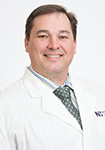Dr. David O’Toole, 54, a Novant Health pain medicine specialist in Kernersville, recently had a knee replacement performed by Dr. Slade Moore, an orthopedic surgeon at Novant Health Orthopedics & Sports Medicine – North High Point. Six weeks later, he was back to taking care of patients. Dr. O’Toole’s experience is instructive for anyone considering orthopedic surgery.
To find and book a physician click here.
By Dr. David O’Toole, Novant Health Healthy Headlines
For years, I’ve had intermittent pain in my left knee but hoped that it might not get worse. In May 2021, when visiting Charleston, South Carolina, with my daughter, I began limping after the pain became worse. Now that the pain was consistent rather than occasional, I’d delayed long enough. It was time to find out what was wrong and get it repaired.

Dr. O’Toole
I thought it might be a meniscus issue, so I went for an evaluation with my colleague Dr. Christopher Bashore from Novant Health Orthopedics & Sports Medicine -Kernersville. But an X-ray showed it was bone-on-bone arthritis. I learned I may need a total knee replacement.
As an interventional pain physician with a busy practice, I was less than thrilled about having surgery and being out of commission for six to eight weeks. I gained a new appreciation – a whole new world of empathy – for my patients who worry about being out of work for weeks at a time after an operation. Like many of my patients, I took short-term disability for a while. Then, I came back half-time at first to ease into my regular, demanding schedule.
Based on my experience, below are some tips I have for anyone contemplating surgical intervention. Dr. Bashore and I agreed to try less aggressive procedures first. That’s my first tip.
Try conservative therapies first.
I had already tried steroid knee injections with limited relief, so next step was to try Synvisc “knee gel.” Again, limited relief. The next step was genicular nerve blocks where nerves are anesthetized and a radio frequency ablation, a procedure where you use a needle to ‘burn’ nerves, but I got minimal relief.

Dr. Bashore
By October, my patients noticed my limp and asked about it. Dr. Bashore brought in Dr. Slade Moore, another surgeon, and the two collaborated with me on the plan for a total knee replacement. I did what I could to avoid an operation, but it became clear surgery was the only way I was going to improve.
Your surgeon should review your X-rays with you and show and tell you why they’re recommending surgery. The fact that I could see bone-on-bone in the X-ray made this an easy decision.
Ask questions.
I’m fortunate to have great colleagues I know professionally and personally. I had a head start. (If I hadn’t already known these surgeons, I’d have asked my primary care physician for recommendations.) Still, I had questions for them:
– The first question to ask: How much of your service consists of total joint replacements? You want a surgeon who does a lot of these.
– Am I a good candidate for surgery? Not everyone is. If your BMI is too high, your surgeon may want you to lose weight. If you smoke, your surgeon may ask you to quit. If you have poorly controlled diabetes, then this would need to be improved prior to surgery.
– How long would I be in the hospital? I was at Novant Health Kernersville Medical Center for the day of my surgery and discharged home that evening, but most patients will be in the hospital at least overnight.
– How long would I be out of commission? Recovery times vary, but you should expect to spend at least six to eight weeks recovering.
– What did I need to do to prepare? I needed to have a plan for coverage of my patients while I was out. I needed to order medical equipment, such as a walker and bedside commode. I also needed to arrange for someone to help me in the immediate post-op period (one to two weeks).
– What are the potential complications? Infection is a possible complication of any surgical procedure. Bleeding, blood clots after surgery, risk of falling (hence the need for a walker) are also possible.
– What did I need to do following surgery to ensure a smooth recovery? Good communication with your surgeon prior to surgery regarding recovery is essential. Adhering to physical therapy is one of the most important parts of a smooth recovery. Using pain medication, muscle relaxants and anti-constipation medication (opioids can constipate you) are all essential.
– What processes are in place to ensure a smooth recovery? Dr. Moore and his support team have a smooth structure in place for postoperative medications, follow-up and physical therapy.
– How soon would I start physical therapy? Straight away! Physical therapy usually begins within a few hours of this surgery or within a day at the latest. Physical therapy and mobilization of your new joint is essential to a good outcome.
– What kind of follow-up care would I receive? Physical therapy, depending on one’s progress, continues for at least six weeks. A follow-up with your surgeon initially occurs two weeks after surgery then four weeks after that. There can be more based on complications or concerns.
Commit fully.
Understand your role in your recovery. Drs. Bashore and Moore told me everything that was expected of me. Orthopedic surgery isn’t passive. After-care in the form of physical therapy is a crucial part of getting better. I was ready to do my part.
Follow through on your at-home instructions.
After surgery, you have a limited time – weeks, not months – to get your full range of motion back. You have to be aggressive with your physical therapy.
This is major surgery, and the follow-up care you need to take is major, too. I had outpatient PT, but I did exercises at home and at the PT gym, too. I spent an hour and a half at the PT gym two days every week. I bought a Pilates stretch band for $12, and the stretching it enabled did me a world of good. I knew I had no business having surgery if I couldn’t commit to rigorous PT.
Consider your physical therapist.
I wanted a taskmaster – someone to push me. I had outpatient PT with Craig Duggan and his team at Novant Health Rehabilitation Center – Kernersville who were very experienced in taking care of total knee patients. They were phenomenal. Your surgeon’s office can help you find the right physical therapist for you. Your physical therapist should know what your surgeon’s goals are for you. Remember: It’s important to consider more than just your surgeon when scheduling surgery. You need to consider the whole team, and a physical therapist is an important part of that.
Novant Health
Healthy Headlines
Facebook
Instagram
Twitter
YouTube




